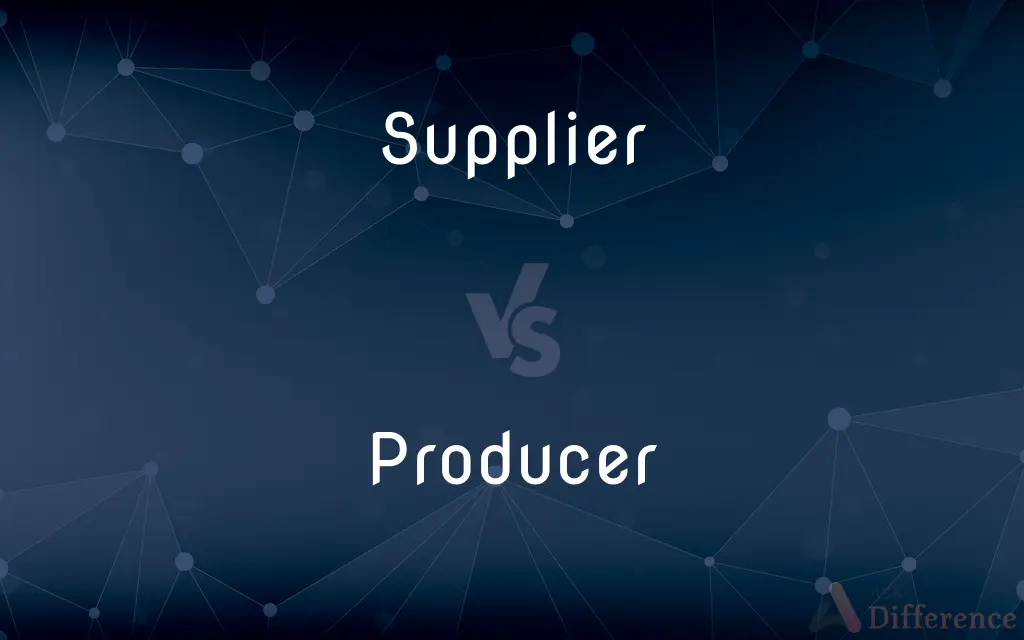Supplier vs. Producer — What's the Difference?
By Tayyaba Rehman & Urooj Arif — Updated on March 12, 2024
A supplier provides products or services to other entities, often sourcing from various producers, whereas a producer creates or manufactures goods firsthand.

Difference Between Supplier and Producer
Table of Contents
ADVERTISEMENT
Key Differences
Suppliers act as intermediaries in the distribution chain, sourcing products from producers to sell to retailers or end-users. They may stock a variety of goods from multiple origins, focusing on the logistics of delivery and availability. On the other hand, producers are at the start of the supply chain, directly involved in the creation or manufacturing of goods. Their primary concern is the design, production process, and quality control of their products.
While suppliers often specialize in the distribution aspect, handling storage, and transportation of goods, producers concentrate on research and development (R&D) to innovate and improve product offerings. Suppliers ensure products are readily available to meet market demand, whereas producers are invested in the technicalities of product creation and refinement.
Suppliers might not have direct control over the quality of the products since they do not manufacture them but can choose which producers to source from based on quality standards. Producers, in contrast, have complete control over their product's quality, from raw materials to final output, ensuring that their specifications are met.
In many markets, suppliers provide additional services such as after-sales support, technical assistance, and product customization options based on customer needs. Producers may offer similar services but are more focused on the manufacturing and innovation side, sometimes leaving the customer-facing services to retailers or suppliers.
Suppliers and producers both play crucial roles in the economy but operate at different stages of the product lifecycle. While suppliers focus on making products accessible, producers are dedicated to creating those products from the ground up.
ADVERTISEMENT
Comparison Chart
Role in Supply Chain
Middleman, distributing products to retailers or consumers.
Originator, creating/manufacturing products.
Focus
Logistics, distribution, and availability of products.
Design, production, and quality control.
Control Over Quality
Limited, dependent on producers.
High, oversees the entire production process.
Services Offered
After-sales support, technical assistance.
R&D, product innovation, sometimes customer service.
Interaction with End-users
Often indirect, through retailers or other channels.
Direct, especially in B2B, but can be indirect through suppliers.
Compare with Definitions
Supplier
A company that manages the logistics of getting goods from producers to retailers.
The supplier's efficient logistics ensure timely deliveries.
Producer
A company or individual that manufactures goods.
The wine producer is known for its sustainable practices.
Supplier
Someone who stocks a variety of goods for distribution.
As a leading medical supplies supplier, they cater to hospitals nationwide.
Producer
An entity responsible for creating products from raw materials.
As a textile producer, they supply fabric to fashion brands.
Supplier
A business that acts as a middleman, ensuring product availability.
Our main supplier has a vast network of local producers.
Producer
Someone involved in the initial stages of the supply chain.
The producer’s innovative techniques have revolutionized the market.
Supplier
An entity that provides goods or services to another company.
The restaurant’s supplier delivers fresh produce daily.
Producer
A business focusing on product design and manufacturing.
The electronics producer releases new models every year.
Supplier
An intermediary in the supply chain focusing on distribution.
The supplier plays a crucial role in keeping the retail shelves stocked.
Producer
An originator of goods, overseeing the production process.
The software producer constantly updates its programs for better performance.
Supplier
A person or organization that provides something needed such as a product or service
The company has to pay suppliers within 90 days of purchase
Suppliers of health care
Every major energy supplier upped their prices
Producer
One that produces, especially a person or organization that produces goods or services for sale.
Supplier
To make available for use; provide
Does the hotel supply towels?.
Producer
A person who supervises and controls the administrative, financial, and commercial aspects of staging a show or performance or of creating and distributing a video or audio recording.
Supplier
To provide something necessary or desired to; furnish or equip
Supplied the players with uniforms.
Producer
A furnace that manufactures producer gas.
Supplier
To have as a necessary or desirable feature
A crime scene that supplied valuable evidence.
Producer
(Ecology) An organism, such as a green plant, that produces its own food through photosynthesis or chemosynthesis and constitutes the first trophic level in a food chain; an autotroph.
Supplier
To fill sufficiently; satisfy
Supply a need.
Producer
(economics) An individual or organization that creates goods and services.
Supplier
To make up for (a deficiency, for example); compensate for.
Producer
One who produces an artistic production, such as an album, a theater production, a film, a TV program, a video game, and so on.
Supplier
The act of supplying
Funds for the supply of the expedition.
Producer
(biology) An organism that produces complex organic compounds from simple molecules and an external source of energy.
Supplier
An amount available or sufficient for a given use; stock
Our supply of milk is low.
Producer
An arrest for speeding after which the driver is allowed seven days (or ten, in the Republic of Ireland) in which to produce his/her driving licence and related documents at a police station.
Supplier
Often supplies Materials or provisions stored and dispensed when needed.
Producer
(archaic) A furnace for producing combustible gas for fuel.
Supplier
(Economics) The amount of a commodity available for meeting a demand or for purchase at a given price.
Producer
One who produces, brings forth, or generates.
Supplier
One who supplies; a provider.
Producer
One who grows agricultural products, or manufactures crude materials into articles of use.
Supplier
(soccer) Someone who assists (sets up) a goal.
Producer
A furnace for producing combustible gas which is used for fuel.
Supplier
One who supplies.
Producer
Someone who manufactures something
Supplier
Someone whose business is to supply a particular service or commodity
Producer
Someone who finds financing for and supervises the making and presentation of a show (play or film or program or similar work)
Producer
Something that produces;
Maine is a leading producer of potatoes
This microorganism is a producer of disease
Common Curiosities
What is a producer?
A producer is an individual or company that creates or manufactures products, often selling them to suppliers or directly to consumers.
How do suppliers and producers differ in the supply chain?
Suppliers act as intermediaries, distributing goods from producers to retailers or consumers, while producers are at the beginning of the supply chain, creating products.
Can a company be both a supplier and a producer?
Yes, some companies both produce and supply their products, controlling more of the supply chain.
What is a supplier?
A supplier is an entity that provides goods or services, usually sourced from various producers, to businesses or consumers.
Why is quality control more significant for producers than suppliers?
Producers have direct control over the manufacturing process and thus can directly influence the quality of their products, unlike suppliers who rely on producers for product quality.
How do suppliers affect product availability?
Suppliers manage the distribution and logistics, ensuring that products are available to meet market demand efficiently.
How do suppliers choose which producers to work with?
Suppliers select producers based on quality, reliability, production capacity, and potentially ethical considerations.
Why might a business choose to buy from a supplier rather than a producer?
Buying from a supplier can offer advantages like smaller quantities, diverse product ranges, and logistical convenience.
In what ways do producers focus on innovation?
Producers invest in research and development to create new products or improve existing ones, focusing on innovation and market needs.
Do producers directly sell to consumers?
While producers often sell through intermediaries like suppliers or retailers, some sell directly to consumers, especially in B2C models.
What services might a supplier offer that a producer might not?
Suppliers may offer additional services such as after-sales support and technical assistance, which producers might not focus on.
How do regulatory standards affect producers and suppliers differently?
Producers must adhere to production and safety standards, whereas suppliers must ensure the products they distribute meet these standards and legal requirements for sale.
What is the main advantage of dealing directly with a producer?
Dealing directly with a producer can offer benefits like lower prices, custom product options, and direct access to product information and support.
What role does logistics play for a supplier?
Logistics is crucial for suppliers as it involves the transportation, warehousing, and distribution of goods from producers to the point of sale.
Can suppliers influence product design?
Suppliers typically don't influence product design; this is the domain of producers who create and innovate products.
Share Your Discovery

Previous Comparison
Concern vs. Care
Next Comparison
Retrograde vs. AntegradeAuthor Spotlight
Written by
Tayyaba RehmanTayyaba Rehman is a distinguished writer, currently serving as a primary contributor to askdifference.com. As a researcher in semantics and etymology, Tayyaba's passion for the complexity of languages and their distinctions has found a perfect home on the platform. Tayyaba delves into the intricacies of language, distinguishing between commonly confused words and phrases, thereby providing clarity for readers worldwide.
Co-written by
Urooj ArifUrooj is a skilled content writer at Ask Difference, known for her exceptional ability to simplify complex topics into engaging and informative content. With a passion for research and a flair for clear, concise writing, she consistently delivers articles that resonate with our diverse audience.














































